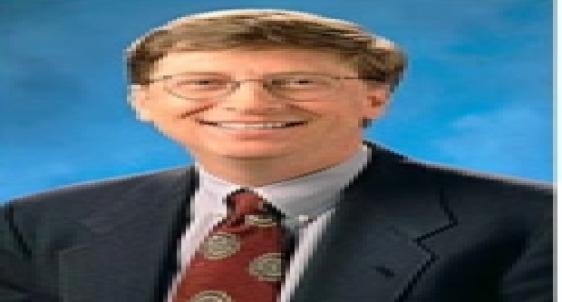
India's leading management portal MBAUniverse.com has officially tied-up with UK based Thinkers 50, to present this global ranking. Our readers will remember the first article in this series was on none other than CK Prahalad, who is ranked as the # 1 Business Guru on this ranking. Read on for Bill Gates' Business Mantras.
Bill Gates' Business Mantras
William Henry Gates III (b. 1955) was born in Seattle. He won a place at Harvard but dropped out, partly through lack of confidence in his teachers. In 1976 his interest in electronics propelled him to found with his friend Paul Allen a company for writing software for micro-electronic devices called Microsoft. Their first product was a version of the programming language BASIC for the primitive Altair 8800, the first personal computer in the world.
Five years later they licensed an operating system MS DOS to IBM for use with that company's nascent personal computer. Gates and Allen retained the right to use and develop the system themselves. Gates had a mission, to put a personal computer (using Microsoft software and programming languages) on every desk and in every home. IBM felt that the PC was at most a fad or a toy. The personal computer market mushroomed throughout the 1980s and 1990s, and with it grew the success of Microsoft.
Bill Gates likes to portray himself as something of a techno-prophet, but neither he nor Microsoft have a sure Midas touch. He was at first dismissive of the Internet, seeing it as a geek's plaything. Once he realised his mistake he made a high-speed U-turn. The result has included Microsoft Outlook. Microsoft's operating system for networks and servers, Microsoft NT, was an expensive flop, and not a few computer professionals see Microsoft software as "bug-infested" and unreliable. Gates decided in 1998 to re-organise the company under the banner of VV2 (Vision Version 2). It was split into eight autonomous units. Gates himself, while remaining at the Microsoft helm, has taken less of a hands-on approach in recent years. He devotes more of his time to work with the Bill and Melinda Gates Foundation, the world's richest.
Bill Gates does not belong to any university faculty. He doesn't consult or coach. Neither does he lecture. He is not a hermit and his thoughts on management have been made widely available, through his two books The Road Ahead (1995) and Business @ the Speed of Thought (1999). His involvement with his company and with the industry as a whole has always been transparent. People could see (some of) what he was doing at Microsoft.
He has always had quite a lot to say about strategy. In the manner of management gurus he has isolated six things that a company should do to achieve success in any market. It should:
1. Concentrate on a market with big potential and few competitors
2. Get in early and go in big
3. Set up a proprietary position
4. Protect that position using every method available
5. Aim for high gross margins or the highest available
6. Make customers an offer they find hard, if not impossible, to refuse
Microsoft is a knowledge company. Its assets are its highly-skilled and creative workers. It is held together by a digital nervous system (DNS) of e-mail, allowing instant connectivity. This also allowed a high degree of supervision to Gates when he was active. He could supervise and comment upon even the smallest detail of the work of individual employees.
Some visitors have likened Microsoft's headquarters to a university campus. There are
lots of opportunities for brain-storming, sharing ideas and generally interacting in as informal a way as possible. Gates has always sought to inject the organisation with vital components. There are five, all of which begin with the letter 'E':
- Enrichment - employees are attracted by high salaries and retained through generous option schemes
- Egalitarianism
- Empowerment
- E-mail
- Emphasis on Performance – employees' performances are assessed twice-yearly. They receive a mark on a one-to-five scale. A 'four' is extraordinarily good: a 'one' means they're fired.
Bill Gates is not a management guru in the sense of others. He does not preach, except to his own employees. He does not intimate that what works (or has worked) for Microsoft can be translated into success elsewhere. But his very success inevitably means that what he does at Microsoft is an object of study and emulation by others.
Essential reading
The Road Ahead (1995)
Business @ the Speed of Thought: Using a Digital Nervous System (1999)
Next week: How Alan Greenspan (#3) & Michael Porter (#4) are influencing the global business thinking. This special series is presented by India's leading management portal MBAUniverse.com in tie-up with UK based Thinkers 50. Thinkers 50, produced by UK based management experts Des Dearlove & Stuart Crainer of Suntop Media, is a bi-annual guide to which thinkers and ideas are most influential in today's times. ( www.thinkers50.com)


























